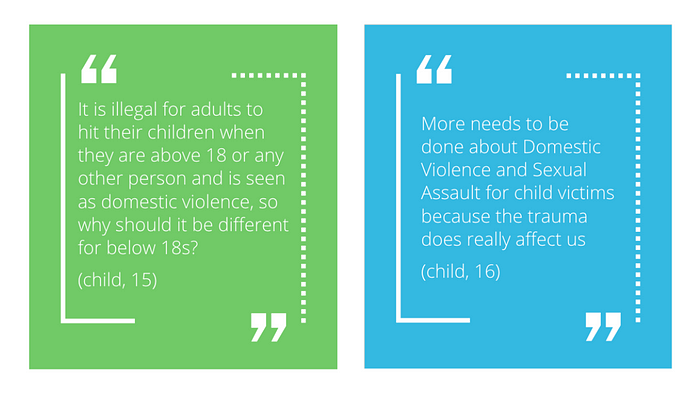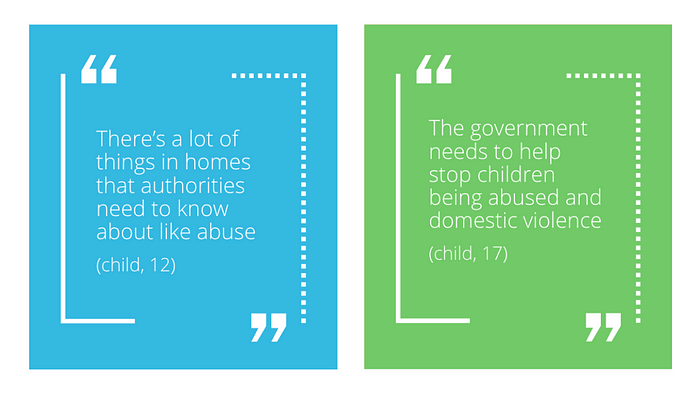Think of the Children: A Moral Argument for Parental Licensing
CW: Child abuse and neglect

Consider this; the Government has introduced a parental licensing scheme that requires aspiring parents to pass an evidence-based evaluation on the quality of parenting they would provide their potential children. Adults are assessed on their emotional and psychological health, financial stability and whether or not they have the time, patience and energy required to raise a child in an environment that would promote the child’s best interests and opportunity for a good life. To most, such a regime would be hailed as overly authoritative and intrusive and would overstep the boundaries of government regulation on body autonomy. However, to adults who have experienced abuse first-hand as a child, such a regime would be a welcome first step towards preventing future generations from experiencing life-long harm and trauma. This essay will discuss how a parental licensing scheme, which focuses on pre-natal education and shifting cultural attitudes, is morally justified.
A snapshot of child abuse and neglect in Australia
On 17 December 1990, Australia ratified the Convention of the Rights of the Child (the Convention) and in doing so committed to incorporating these rights into its domestic legislation and policy. However, despite this commitment, Australia continues to fall short in its commitment to the Convention, particularly Article 19:
“State Parties shall take all appropriate legislative, administrative, social and educational measures to protect the child from all forms of physical or mental violence, injury or abuse, neglect or negligent treatment, maltreatment or exploitation, including sexual abuse, while in the care of parent(s), legal guardian(s) or any other person who has the care of the child.”
Despite this commitment, 27% of Australia’s entire population of children are exposed to domestic violence at some point in their lives — this figure jumps to 47% for Aboriginal and Torres Strait Islander children. Mental health issues affect 50% of Australia’s entire populous of children. In 2019, 17% of children under the age of 15 live in poverty, 8.7 per 1000 children live in out-of-home care, and 25,827 under 18 years old are homeless. Meanwhile, Australia saw an increase of 27% in substantiated claims of parental abuse and neglect from 2013–2016. From 2013–2020, there were between 7,000–8,500 reported incidents of sexual assault per year to children under the age of 14. Meanwhile, more than 2.5 million adults have experienced physical and sexual abuse before the age of 15 years old at the hands of a parent or family member.The economic cost of child abuse is placed at $15.9 billion per year.

Research focused on the developmental impacts of child abuse show significant physical, cognitive and emotional disparities in the neurobiological development of survivors. These disparities lead to psychological, behaviour and learning problems that persist for decades throughout the adult-survivor’s life, with Complex-PTSD, Depression and Anxiety disorders commonly reported as ongoing issues. Last, evidence shows that survivors of child abuse have a higher rate of developing harmful drug and alcohol habits or becoming involved in criminal and anti-social behaviour — leading to broader social costs designed to mitigate the effects of both mental health issues and crime.
However, despite these figures and the impact that child abuse has on children, adults, families and society — the discussion of child abuse and neglect continues to remain within the private sphere of the family, with the rights of privacy for adults prioritized over preventative measures for protecting children.
The moral obligations of parents
Historically, children have been thought of as an extension of their parents at best and chattel at worst. As a result, parents have always maintained a protected realm of privacy around how they have raised their children — a level of authority that is not seen in other fiduciary relationships. As such, the level of parental authority over a child is justified because parents play a crucial role in the moral education of their children. This authority is derived from parents requiring to fulfil their obligations to promote the child’s best interests for the child to develop into a participating member of society with the opportunity to pursue a good life. This is predominantly where anti-abortionist and parental licensing arguments differ. Where anti-abortionists interpret the right to life as a right to exist — a right that ironically does not exist — their concerns stop at the birth of the child and harbour no consideration for the welfare of the mother and resources required to raise a child. In contrast, parental licensing advocates look beyond the child’s immediate birth and consider the child’s interest and future prospects — and, therefore, the parent’s capability and resources of the parent(s). This ideology is based on Locke’s Good Life Principle and Mill’s Harm Principle to morally support policies that would pierce the veil of parental privacy.

Locke’s good life principle stipulates that a life worth pursuing is based on pursuing the greatest good — not only for ourselves but for others and the society we live in. This good life is achieved through a foundation of liberty, in which each person harbours the free will to determine their own course and actions. The argument for liberty has long since been one used to espouse the right to freedom, but in this context it is used to provide that a person will be free to pursue the activities that are good for them, uninhibited by their economic, racial, gendered or social-political status. In essence, when viewed through a utilitarianism lens, parents have an obligation to raise their child in a manner that provides them with the best opportunity to contribute to the overall good of society, and the State bears a responsibility to ensure that parents are supported to achieve this outcome — that is, at all costs, to avoid creating harm.
John Stuart Mills’ Harm Principle defines the difference between hurt and harm as harm being the ‘wrongful setback of interests’, whereas hurt may be a slight inconvenience, it is nonetheless inadequate in its wrongfulness. The harm principle provides that “the only purpose for which power can be rightfully exercised over any member of a civilized community, against his will, is to prevent harm to others.” That is, without harm there is no reason for State interference — and it is harm and only harm alone that can justify the existence of a radical and invasive policy. When applying the harm principle to the question of parental licensing, the argument is not to determine whether interference is warranted but to shift the focus onto recognizing that there are acts of harm that do warrant interference — such as extreme violence, sexual assault and acts that will negatively impact the development and future of the child. These are the acts that cannot be ignored and warrant preventative measures. I would go as far as to speculate that most would agree that acts of sexual assault to children should be prevented, rather than identified and remedied after the harm has already occurred. I would hope that most would agree with this notion.
A parental licensing program would ensure that parents who intend to raise their children do so in good faith and understand their moral obligations to their child. Parents who maintain their right to raise their child, will have shown that they entered into the decision to become parents through critical thought and consideration of the livelihood of themselves and their child. Those deemed high risk of harming their children would forfeit this right. This may seem invasive; however, it is worth pointing out that it is no more invasive than the current family law system, which interferes with the biological family after a child has been harmed. In harming a child, a parent forfeits their rights and obligations over their child. Therefore, a parental licensing scheme would not produce further harm by preventing adults from exercising a right they have forfeited. Essentially, a right cannot be taken away if it is deemed to have not existed in the first place. More so, this logic and application of the harm principle is on par with those who seek to be adoptive and IVF parents who are heavily scrutinized on their parenting ability before receiving permission to raise a child. If such measures are in place for adoptive and IVF parents, then there seems to be limited argument available for defending the rights of biological parents who are free to reproduce with untethered wantonness.
Objections: body autonomy and disenfranchised families
Article 16 (e) of the Convention on the Elimination of All Forms of Discrimination Against Women (CEDAW) provides that: women shall have the right to decide freely and responsibly on the number and spacing of their children and to have access to the information, education and means to enable them to exercise these rights. The United Nations Department of Economic and Social Affairs reiterated this point further by adding the recommendation that Governments are urged to ensure that this right should take into account the needs of their living and future children and their responsibilities towards the community. A recommendation that entrenches Locke’s utilitarianism good life principle into human rights doctrine.

An immediate face-value objection to a parental licensing scheme is that it would remove this right under Article 16 and negatively impact women’s reproductive rights. To be clear, a parental licensing scheme does not seek to control women’s rights to pregnancy through anything as heinous as forced abortion or contraception — it aims to ensure that parents are competent enough to raise their child in order to prevent harm after birth. However, regarding women’s rights for body autonomy, it can be argued that in the current pro-natalist climate — where women are groomed for motherhood from early childhood — the social pressure to fulfil the narrative of becoming a mother is a form of systematic coercion. That is, the decision for a woman to have a child can hardly be made freely and responsibly within a culture that holds uncritically held beliefs that motherhood is the height of feminine attainment. Parental licensing would strengthen Australia’s commitment to Article 16 by radically supporting the autonomy of women through parental education by allowing them to:
(a) possess the capacities that make autonomous thought and action possible (that is, free of societal pressures and expectations); and
(b) hold a position to develop accurate beliefs about reproduction and parenting in regards to one’s life goals, aspirations and beliefs.
Essentially, a parental licensing scheme would contribute towards a much-needed shift in cultural values and encourage women and their partners to think critically and autonomously about the decision to have a child. Education which promotes reflection and self-knowledge of one’s own capabilities would encourage the population to fully consider the personal sacrifices required to maintain parental moral obligations to a child. A pattern that is not yet seen with reports showing that 1 in 4 pregnancies in Australia are unplanned.
A second objection is that a parental licensing scheme would discriminate against economically disenfranchised families. This is a valid concern, as 42% of children found to be victims of abuse are from families of low socio-economic status. LaFollette’s original proposal for a parental licensing scheme is brutally authoritative in nature and suggests that parents who are not licensed would see their child adopted out to approved parents. Not only would this recreate a new stolen generation of children, but it is morally problematic on many counts. Others have built on LaFollette’s argument to develop a more holistic parental licensing model based on principles of education, autonomy, economic empowerment and social investment by the State, while still maintaining principles of fairness and integrity regarding administrative decision-making. A scheme that draws upon these values would operate similarly to other licensing schemes. For example, whereby one might be denied from obtaining a driving license after failing a test, further State-funded education and counselling focused on personal growth and skill development would allow a person the opportunity to gain a parental license at a later stage.
A common singularity amongst disenfranchised families is a lack of adequate support required to alleviate the stress of living costs. It is evident that parental stress plays a critical role in abusive families. Reducing this stress is the logical solution to reducing the risk of child abuse. Article 23 of the ICCPR stipulates that the family unit that forms the foundation of society. If this is so, then State has a greater role to play in ensuring that families receive adequate support to maintain the health of the family. While a parental licensing scheme would most likely result in invasive measures such as; additional scrutiny and monitoring of disenfranchised families, the aim of these measures would ultimately be to identify which support mechanisms parents need to meet the emotional, financial and material needs of both themselves and their children. And then ensuring that the State provides for those needs — support that is currently not adequately provided, as the welfare system fails to account for health and education in its measure of living standards. Again, it should be reiterated that a parental licensing scheme is not aimed at preventing people from becoming parents — but at ensuring that adequate support mechanisms are in place to prevent child abuse. That is, the minimum standard expected of parents is simply that a child should be raised in an environment where they are free from physical, emotional, and sexual abuse and neglect. This standard is already operational in Australia’s family law system which sees children removed from their parents once substantiations of abuse have come to light — a process which not only allows for abuse to happen but causes additional trauma through the process of removal. A parental licensing scheme would ensure that parents are supported before birth and overall would reduce the need for children to be removed from high-risk families.
Article 19 calls for States to play an active role in protecting children from experiencing such abuse, and when read in context with the entirety of the Convention, it is interpreted to mean that the State has an obligation to prevent child abuse and neglect. As such, given the commitments made by the State, consideration of the impacts of harm on children and the moral obligations of States and parents:
1. Interference to prevent harm to children is warranted; and
2. A parental licensing scheme is an interference to prevent harm to current and future children and any future harms those abused children might later inflict; and
3. A less intrusive means and more competent means to prevent child abuse does not exist; therefore
4. A parental licensing scheme is warranted so long as there exists a State and parental obligation to prevent harm to children.
A note to the reader: This essay is written in response to a prompt for a university assessment. We were tasked with choosing a topic that was personal to us, and as a survivor of child abuse and neglect, the concept of parental licensing has always been a topic I’ve been interested in exploring further. In saying that, I acknowledge that a parental licensing scheme would infringe upon some rights regarding privacy, I in no way support any policy that would reduce women’s rights in regards to body autonomy, access to abortion, and health and family planning services. This essay does not reflect the views of any association or organisation that I am affiliated with.
References
Ainsworth, Frank, ‘Parental licensing: an Australian perspective’ (2019) 44(4) Children Australia
Alston, Philip (ed) and Brennan, Glen (ed), The UN Children’s Convention and Australia, (The Human Rights and Equal Opportunity Commission, Sydney and The ANU Centre for International Public Law, Canberra, 1991)
Australian Human Rights Commission, Children’s Rights in Australia: a scorecard (Report, 20 November 2019)
Australian Human Rights Commission, Children’s Rights Report 2019 – In Their Own Right: Children’s Rights in Australia (Report, 28 October 2019)
Australian Human Rights Commission, Face the facts: Children’s Rights (Report, 2014)
Australian Institute of Family Studies, The economic cost of child abuse and neglect (Report, September 2018)
Australian Institute of Health and Welfare, Australia’s Children — Justice and Safety (Data tables, 2022)
Australian Human Rights Commission, Child Protection: Every Child’s Right (Speech, 9 September 2014)
Bortolotti, Lisa, ‘Reproductive and parental autonomy: an argument for compulsory parental education’ (2009) 19(1) Reproductive BioMedicine
Callendar, Emily J et al, ‘Towards a holistic understanding of poverty: A new multidimensional measure of poverty in Australia’ (2012)21(2) Health Sociology Review
Cohen, Andrew, ‘The Harm Principle and Parental Licensing’ (2017) 43(4) Social Theory and Practice
Convention on the Elimination of All Forms of Discrimination Against Women
Convention on the Rights of The Child
Henricson, Clem, ‘Governing Parenting: Is There a Case for a Policy Review and Statement of Parenting Rights and Responsibilities?’ (2008) 35 (1) Journal of Law and Society
International Covenant on Civil and Political Rights
Kisely, Steve et al, ‘Child maltreatment and mental health problems in adulthood: birth cohort study’ (2018) 213 The British Journal of Psychiatry
Lafollette, Hugh, ‘Licensing Parents’ (1980) 9 (2) Philosophy and Public Affairs
LaFollette, Hugh, ‘The Moral and Political Status of Children’ (2004) 82(4) Australasian Journal of Philosophy.
Locke, John, An Essay Concerning Human Understanding (Oxford: Clarendon Press, 1948).
Mill, John Stuart, On Liberty (J.W Parker and Son, London, 1859).
Noggle, Robert’ Special agents: Children’s autonomy and parental authority’ in David Archald and Colin M. Macleod (eds.), The Moral and Political Status of Children (Oxford University Press, 2002)
Parliament of New South Wales, Parental Responsibility Laws, Briefing Paper No 7/06 (May 2006)
Taft, Angela J et al ‘Unintended and unwanted pregnancy in Australia: a cross-sectional, national random telephone survey of prevalence and outcomes’ (2018) 209(9) The Medical Journal of Australia.
United Nations Department of Economic and Social Affairs, Population Division, Recommendation No 30 under the International Conference on Population (1994)
Whipple, Ellen E’ The role of parental stress in physically abusive families’ (1991) 15(3) Child Abuse & Neglect.
